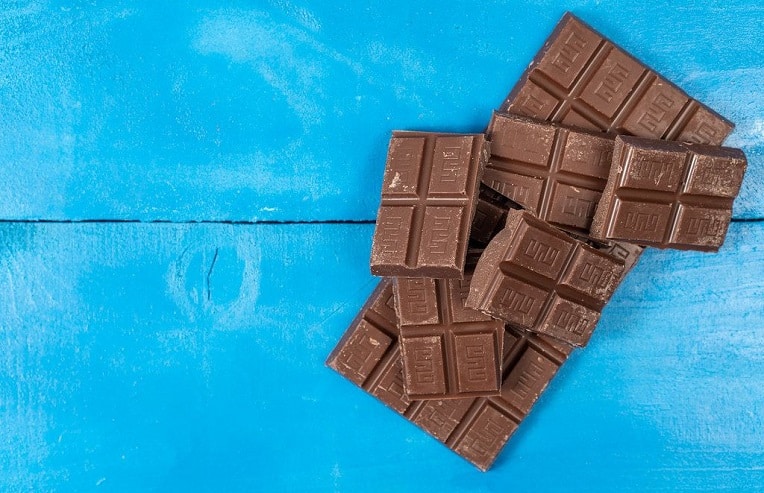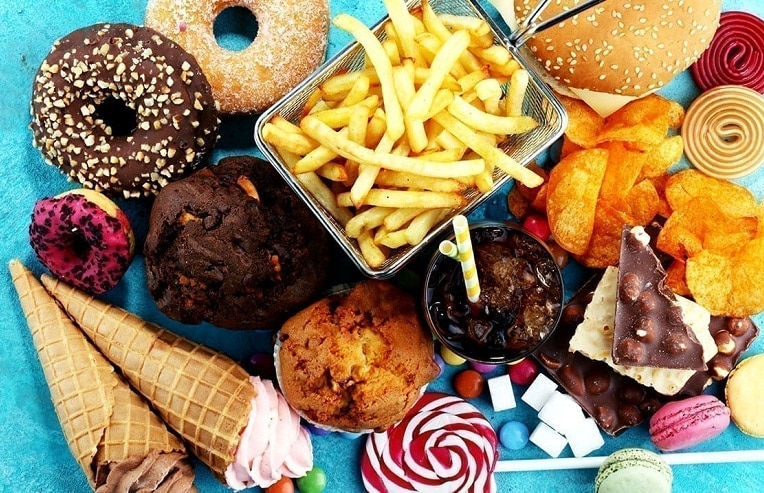It’s 10 PM, and you’re relaxing on your couch, watching a movie when it hits you. An intense desire for something sweet, like ice cream. You try to ignore it. After all, you’ve been doing so well with your diet. But it keeps nagging you, making you feel as if you need something sweet to be happy. Eventually you might give in — and everything feels so much better.

Many people would say these intense desires to eat — or food cravings — are just a normal part of the human experience. In fact, a whopping 90% of the population admit to having them.1 But, what are these food cravings meaning?
In this blog post, we’ll learn top 5 facts about food cravings.
Top 5 Facts About Food Cravings
Having a craving isn’t just being hungry. It’s an intense desire for a specific type of food. And more often than not, food cravings are for salty, sweet, or highly fatty foods.
You might be surprised to learn that food cravings are multidimensional. There are different factors to our food cravings meaning.
1. Stress Plays a Big Role
Surprised? Probably not. You may have seen movies where a stressed-out character starts binge-eating junk food.
But why does stress cause us to overeat or crave particular types of foods?
To make matters even more confusing, short-term stress actually shuts down appetite. This response is due to the hormone epinephrine (or adrenaline), which triggers our body’s fight-or-flight response and shuts down our digestive system.
When you’re under chronic stress, the situation changes. Your adrenal glands produce another hormone called cortisol, which stimulates appetite and makes you want to eat sugary, salty, or fatty foods.2
Research shows that sugary foods dampen stress response, thereby reinforcing habitual overconsumption.3

2. A Hormonal Imbalance May Be The Culprit
Do you find yourself craving certain types of food during specific phases of your menstrual cycle? What are these food cravings meaning?
Turns out your hormones are behind them.
Researchers have found that women with higher estradiol levels during their luteal phase crave more carb-rich foods and sweets. Women with higher progesterone also had cravings for sweetened beverages.4
But remember, it’s not all about the level of an individual hormone. One study found that low estrogen and high progesterone led to increased cravings.5
What this suggests is that it’s about the balance between estrogen and progesterone. And your estrogen-to-progesterone ratio might differ from another woman’s.
There are other hormones at play as well, like cortisol, as we discussed above. And there are many factors that can cause hormonal imbalances, so I recommend working with your healthcare practitioner to identify which ones are out of balance for you.
3. An Imbalanced Gut Microbiome May Be Manipulating You
We all know highly processed junk foods are bad for us. But we still find it hard to resist them sometimes. Some people may say all you need is “self-control.”
Experts propose another theory: you’re being manipulated — by your gut microbiome.
Gut microbial genes outnumber those in your own genome by 100 to 1.6 This “microbial organ” provides us with many benefits, such as the ability to harvest otherwise inaccessible nutrients.7
Scientists think our relationship with our gut microbiome is not strictly commensal, where one partner benefits while the other is unaffected. As with any complex intimate relationship, sometimes the interests of the two parties conflict.
Additionally, microbes compete with one another over resources and habitat. A highly diverse gut microbiome means the microbes are more likely to spend their energy and resources competing with one another, and less time on manipulating the host (you). On the other hand, a less diverse microbiome means you’re more likely to have species that are larger in population and have more resources for host manipulation.8
There is evidence that some members of your gut microbiome depend on specific nutrients for survival. For example, Prevotella is associated with plant-derived carbs,9 and Bacteroidetes species have a preference for certain fats.10 Your gut microbiome may also play a role in whether you’re a “chocolate desiring” person or a “chocolate indifferent” person!11
4. Poor Circadian Habits Affect More Than Just Your Sleep
You know that not getting enough sleep is bad for your health. But when you sleep may have just as big of an impact on your overall health — and your appetite.
The reason for this lies in your body’s biological clock, also known as your circadian rhythm. Your circadian rhythm follows a roughly 24-hour cycle, usually in response to light.
A region in your brain called the hypothalamus contains a population of neurons that serve as the “command center” for hunger. And scientists have found that your clock genes play an important role in relaying messages to these neurons.12
Importantly, scientists found that when the function of these clock genes are turned off in mice, the feeding patterns of the mice changed. While mice normally eat at night, the mice whose clock genes were turned off began eating much more during the day.13 This disruption to the circadian clock is similar to what happens in people who don’t work a traditional 9 to 5 job, especially those working a night shift.
Shift work is also associated with poor sleep quality.14 One recent study reported that poor sleep quality and short sleep duration were linked to more food cravings.15
And research suggests that sufficient disturbance to the circadian clock could lead to the development of cancer.16
That’s why one of the best things you can do to curb your food cravings is to align your eating schedule with your circadian clock.
5. Not Getting Enough Protein Leads to Constant Hunger
Are your food cravings meaning you are needing more protein? Protein is by far the most filling macronutrient.17 This effect is partly thanks to protein’s ability to reduce your level of ghrelin, the hunger hormone.18 So raising your protein intake may be one of the best methods to prevent food cravings from occurring in the first place.
Eating a high-carb diet often causes blood sugar levels to spike and crash. Studies show that when your blood sugar levels crash, your appetite returns earlier (and your mood worsens as well).19
Protein can help blunt the digestion and absorption of carbs into your blood, which helps stabilize blood sugar levels.20 In turn, a stable blood sugar level may help reduce cravings.

How to Curb Your Food Cravings Naturally
So what can you do to stop those late-night sugar cravings? Here are my top tips on how to curb your food cravings naturally.
Balance Your Hormones
To restore balance to your hormones, it’s important to identify your food cravings meaning. That’s why I advocate for the “test, don’t guess” approach.
I also recommend testing for the following:
- Cortisol
- Fasting insulin
- Methylenetetrahydrofolate reductase (MTHFR) gene mutations
- Sex hormone-binding globulin
- Free T4, free T3, and TPO
You can read about each test here.
If an imbalance in estrogen levels is found to be the cause of your food cravings, here are some of the ways you can support estrogen detoxification:
- Exercise
- Saunas
- Antioxidants
- Green tea
- Increased fiber consumption
You will want to be more conscious of xenoestrogens around you. They can be found in many everyday items such as plastics, pesticides, cosmetics, sealants, and preservatives.
Try Intermittent Fasting
Intermittent fasting (IF) is an eating method that involves a cycle of eating for a period of time and fasting for others.
Evidence suggests that IF has an effect on serum levels of the satiety hormone, leptin. Leptin is released mostly by your fat cells and acts on your brain to regulate hunger and energy. When you eat, leptin rises, and your appetite decreases.
In other words, leptin tells your body when you’re full so that you don’t feel the need to eat more when you don’t need to.
But that’s when everything is working correctly. Some people become less sensitive to leptin, a state called leptin resistance. Put simply, your body ignores signals that tell it to stop eating. Leptin resistance can lead to obesity and other inflammation-related diseases, such as heart disease.21,22
A recent study by scientists at the University of Colorado found that IF has a positive effect on the gut microbiome.23
Studies show that fasting elicits significant reductions in leptin concentrations in the blood. And because leptin suppresses sweet taste,24 this means that you may find yourself struggling with sugar cravings when you begin IF.
But don’t give up. Long-term fasting can increase leptin levels, so you may no longer crave sugar or overeat.25
Support a Healthy Gut Microbiome
Your diet has a profound influence on the health of your gut microbiome. In general, I recommend the following for a healthier gut microbiome:
- Avoid highly processed and high sugar foods
- Avoid snacking
- Eat more fiber
- Eat a Mediterranean diet
A diet high in dietary fiber is particularly important for gut health. Numerous research studies show that high dietary fiber consumption is associated with greater microbial diversity.26 One study from Washington University School of Medicine in St. Louis showed that certain gut microbes are able to mine dietary fiber for beneficial nutrients that would otherwise be inaccessible to humans.27 This just goes to show the tremendous potential of dietary fiber for your health.
Probiotics are another great way to support a healthy gut microbiome. However, it’s important to note that even natural supplements like probiotics aren’t harmless. The National Center for Complementary and Integrative Health cautions that some people with compromised immune systems may experience harmful effects such as infections.28
If you suffer from a severe illness, I encourage you to work with an experienced healthcare professional to determine whether probiotics are right for you.
Manage Your Stress
If stress or certain emotions are your triggers for eating, it’s critical that you manage your stress in healthy ways. You’ll be able to counter food cravings and improve your overall health.
A few ways to naturally conquer your stress include:
- Meditation
- Exercise
- Yoga
- Breathing exercises
- Stretches
- Laughter
- Social support
- Positive self-talk
Check out my blog post Ten Healthy Stress Hacks for more tips.
Kiss Food Cravings Goodbye With a Women’s Hormone Specialist in Boston
Food cravings might not seem like a big deal. We all get them. But when you look at potential food cravings meaning, you may realize that your cravings are just one piece of what’s going on in your body.
But you can overcome your food cravings by bringing balance to your entire body. As a naturopathic physician and women’s hormone specialist, I can help guide you on your journey.
If you would like to learn more about how you can balance your hormones and gut health naturally to curb your food cravings, schedule a consultation with me today.
References:
- https://www.ncbi.nlm.nih.gov/pmc/articles/PMC4918881/
- https://health.clevelandclinic.org/how-stress-can-make-you-eat-more-or-not-at-all/
- https://www.ncbi.nlm.nih.gov/pmc/articles/PMC4454811/
- https://faseb.onlinelibrary.wiley.com/doi/abs/10.1096/fasebj.30.1_supplement.418.6
- https://pubmed.ncbi.nlm.nih.gov/29886181/
- https://www.ncbi.nlm.nih.gov/pmc/articles/PMC4530069/
- https://pubmed.ncbi.nlm.nih.gov/15790844/
- >https://www.ncbi.nlm.nih.gov/pmc/articles/PMC4270213/
- https://www.nature.com/articles/s41522-021-00248-x
- https://www.ncbi.nlm.nih.gov/pmc/articles/PMC3368382/
- https://pubmed.ncbi.nlm.nih.gov/17929959/
- https://www.cell.com/cell-metabolism/fulltext/S1550-4131(19)30063-4
- https://www.cell.com/cell-metabolism/fulltext/S1550-4131(19)30063-4
- https://www.ncbi.nlm.nih.gov/pmc/articles/PMC5556302/
- https://www.ncbi.nlm.nih.gov/pmc/articles/PMC7551988/
- https://www.ncbi.nlm.nih.gov/pmc/articles/PMC7120250/
- https://pubmed.ncbi.nlm.nih.gov/16469977/
- https://pubmed.ncbi.nlm.nih.gov/16469977/
- https://www.sciencedirect.com/science/article/abs/pii/S0195666314002049
- https://www.joslin.org/patient-care/diabetes-education/diabetes-learning-center/carbs-protein-and-fats-their-effect
- https://www.frontiersin.org/articles/10.3389/fendo.2021.585887/full
- https://www.ncbi.nlm.nih.gov/pmc/articles/PMC7325922/
- https://www.mdpi.com/2072-6643/15/16/3588
- https://www.ncbi.nlm.nih.gov/pmc/articles/PMC4876703/
- https://www.ncbi.nlm.nih.gov/pmc/articles/PMC6148150/
- https://www.ncbi.nlm.nih.gov/pmc/articles/PMC8153313/
- https://www.cell.com/cell/fulltext/S0092-8674(22)00709-7
- https://www.nccih.nih.gov/health/probiotics-what-you-need-to-know




